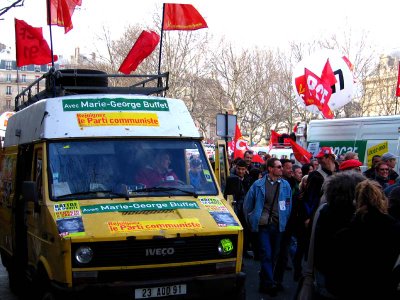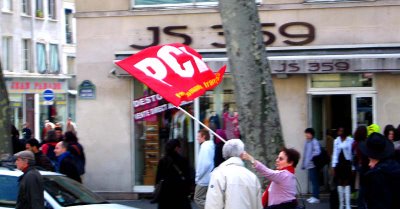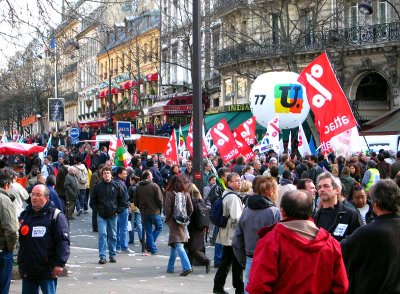The government saw such a contract as a way to encourage employers to hire more young people. Many young people saw it as discriminatory. Demonstrations followed. Reports said there were as many as three million demonstrators in the streets in cities around the country on March 28 and again on April 4, when a second general strike was called. Those were days that we spent in Paris.
Here are some of my pictures from that week. Click on the pictures to see full-size views.
 The current generation of students complains of précarité, which translates as job insecurity. The banner in the picture above was strung up at a métro station near the Place de la République in Paris on Tuesday April 4. The Place de la République is a big square in northeastern Paris where demonstrations are frequently held. The little apartment we rented for our Paris trip was just about 500 yards to the west of République.
The current generation of students complains of précarité, which translates as job insecurity. The banner in the picture above was strung up at a métro station near the Place de la République in Paris on Tuesday April 4. The Place de la République is a big square in northeastern Paris where demonstrations are frequently held. The little apartment we rented for our Paris trip was just about 500 yards to the west of République. That same afternoon at République there was quite a crowdat about five o'clock. These people are marching under the banner of the PCF, the Parti communiste français. The green banners on the van carry the name of the PCF's leader, Marie-George Buffet.
That same afternoon at République there was quite a crowdat about five o'clock. These people are marching under the banner of the PCF, the Parti communiste français. The green banners on the van carry the name of the PCF's leader, Marie-George Buffet. On the Grands Boulevards, near the Porte Saint-Martin, we saw a big group marching toward République. This woman is holding up the PCF's red flag.
On the Grands Boulevards, near the Porte Saint-Martin, we saw a big group marching toward République. This woman is holding up the PCF's red flag. This was the aftermath of the April 4 demonstration at République. The crowd had thinned out as the demonstrators marched to the Place d'Italie, in the southeastern quadrant of Paris.
This was the aftermath of the April 4 demonstration at République. The crowd had thinned out as the demonstrators marched to the Place d'Italie, in the southeastern quadrant of Paris. At République, at typical scene on April 4. The CGT is the Confédération générale du travail, a labor union more or less allied with the PCF, the French communist party.
At République, at typical scene on April 4. The CGT is the Confédération générale du travail, a labor union more or less allied with the PCF, the French communist party. We were out for a walk around the city and just wanted to cross from one side of République to the other. At first we thought that might be impossible. But we found a break in the crowd and made it through. The atmosphere was relaxed and easy, despite what you might think.
We were out for a walk around the city and just wanted to cross from one side of République to the other. At first we thought that might be impossible. But we found a break in the crowd and made it through. The atmosphere was relaxed and easy, despite what you might think. The demonstrations on April 4 were big enough to convince the Chirac government that it had a big problem on its hands, but they weren't especially violent or even all that disruptive. Métro trains ran at just slightly reduced service levels, as did buses. Most people were able to go about their daily lives quite normally.
The demonstrations on April 4 were big enough to convince the Chirac government that it had a big problem on its hands, but they weren't especially violent or even all that disruptive. Métro trains ran at just slightly reduced service levels, as did buses. Most people were able to go about their daily lives quite normally. I took the picture above on Friday, March 31, at the Place de la Bastille. We were just walking through when we saw this sit-in. Students were blocking traffic and had backed up a few buses and trucks as well as a lot of cars at this busy intersection. The sit-in had not been announced ahead of time. The demonstrators looked like high school students. They stood and got out of the way when an ambulance came through with its siren blaring, but they wouldn't let cars and buses pass.
I took the picture above on Friday, March 31, at the Place de la Bastille. We were just walking through when we saw this sit-in. Students were blocking traffic and had backed up a few buses and trucks as well as a lot of cars at this busy intersection. The sit-in had not been announced ahead of time. The demonstrators looked like high school students. They stood and got out of the way when an ambulance came through with its siren blaring, but they wouldn't let cars and buses pass. On April 4 we saw this march coming up the Boulevard de Strasbourg from the Place du Châtelet in central Paris, near the Pompidou Center.
On April 4 we saw this march coming up the Boulevard de Strasbourg from the Place du Châtelet in central Paris, near the Pompidou Center. If you click on the picture above to enlarge it, you'll see that the people who noticed me taking their picture were smiling and friendly. We all said bonjour to each other as they passed. The banner says "the law must be withdrawn, period!"
If you click on the picture above to enlarge it, you'll see that the people who noticed me taking their picture were smiling and friendly. We all said bonjour to each other as they passed. The banner says "the law must be withdrawn, period!" Meanwhile, it was common to see large fleets of police cars and vans around the city all week. Here's a convoy of police vans on the Boulevard Saint-Germain in the Latin Quarter. Isn't it funny how white the police vehicles are compared to the red flags and banners of the protesters?
Meanwhile, it was common to see large fleets of police cars and vans around the city all week. Here's a convoy of police vans on the Boulevard Saint-Germain in the Latin Quarter. Isn't it funny how white the police vehicles are compared to the red flags and banners of the protesters?The political situation is this: the prime minister, Dominique de Villepin, pushed the law creating the First Job Contract through parliament. Students and labor union members protested. The president, Jacques Chirac, then announced that he was signing the new law, but he asked employers not to hire anybody under the new contract until after it has been revised. He wanted to reduced the probationary period from two years to one, and he wanted employers to be required to explain their reasons to any employee who was let go during that year.
Some constitutional experts said it was unprecedented, even treasonous, for the president to ask people not to obey a law that he had signed. What if he asked people not to obey laws outlawing murder, for example? Other experts pointed out that the law, once revised according to the president's wishes, will be meaningless. It seems to be a muddled mess. Many are still calling for the law to be abolished.

You're living in interesting times over there, no doubt. It's great to see people respond so strongly to something they care about. We've got our demonstrations over here, but not to the degree that's needed to make a difference in Iraq, I'm afraid.
ReplyDelete